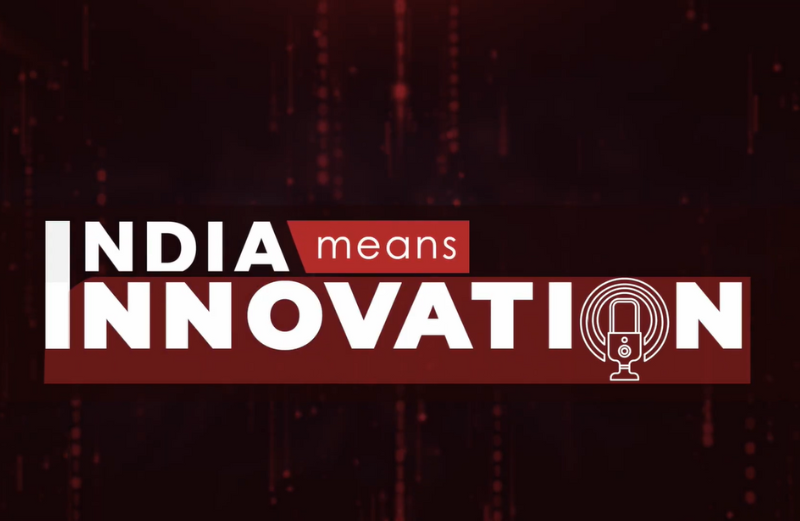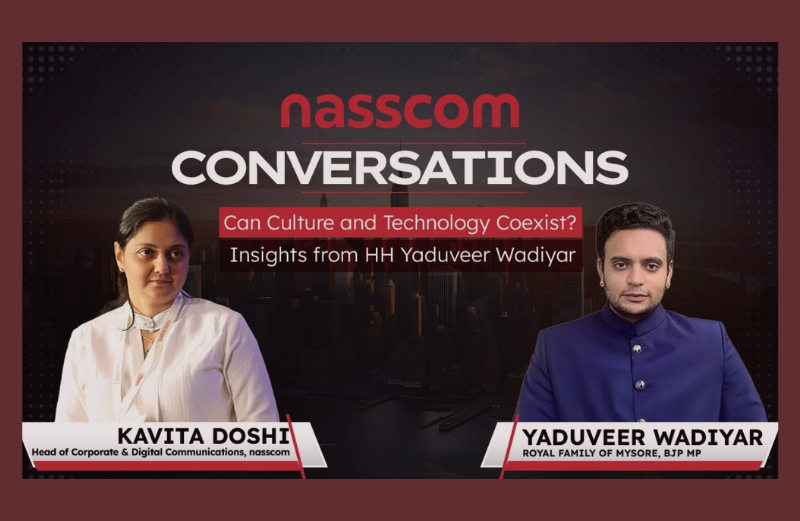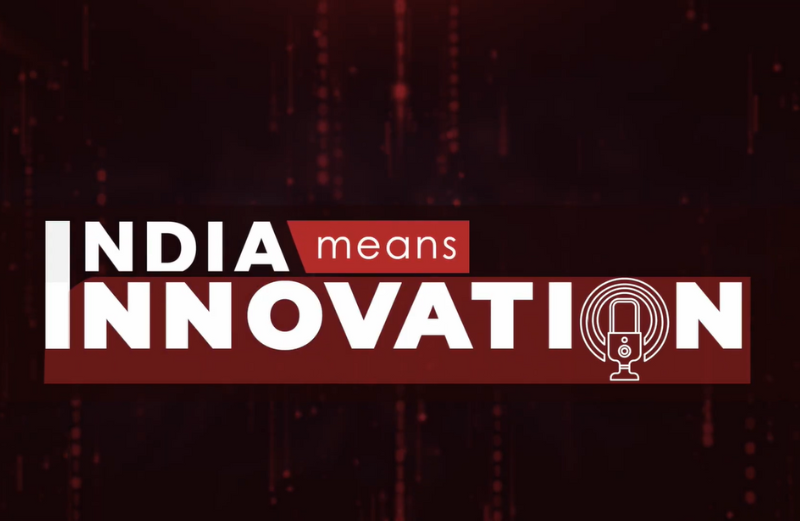Transcript Disclaimer: This transcript has been generated using automated tools and reviewed by a human. However, some errors may still be present. For complete accuracy, please refer to the original audio.
00:00:13 SNEHIL GAMBHIR: Welcome to Nasscom BCG India Means Innovation podcast. Today with us is our guest Brandon Spencer, President of ABB Energy Industries on this trip to India here in Bangalore. Brandon, welcome.
00:00:26 BRANDON SPENCER: Right. Thank you very much for having me.
00:00:27 SNEHIL GAMBHIR: It's a pleasure to have you on. You know, time is short, so I'm going to jump right into the questions. Let me start with a little bit of what history has been telling us about from a progress perspective, right? We've heard a lot about, you know, the transition to new energy and, you know, what has happened in the past. Where are we on that journey today, Brandon? Do you see a lot happening in the next decade or so?
00:00:52 BRANDON SPENCER: Yeah, absolutely. I mean, first off, it's an exciting time to be in the energy space. A lot is talked about these new energies, and I think for ABV it's an equation for us, the world has a big dependency on fossil fuels. 80 plus percent of the energy value chain comes from fossil fuels. And so, there's a very big transportation distribution and consumption system for that. As GDP grows and economies develop, their need for energy grows. And so, for us it's about and let's take care of the traditional industries, the fossil fuel industries. Let's make them clean and as green and as efficient as possible. And then let's help the technology scale in these new lower carbon industries, whichever one we're not taking winners. I think there's room for all of them quite honestly. Let's help them scale, commercialize it and have that be the net additions. So, we talked about net additions with lower emissions.
00:01:46 SNEHIL GAMBHIR: Super. I've heard you say this line; Brandon and I quote the greenest unit of energy is the one we don't consume, right? It's a very interesting comment and I just love that, right? Let me ask you, you know, how is this journey of the transition progressing? And what are some of the things that have worked well globally as well As for ABB in particular, where's there room to do more?
00:02:11 BRANDON SPENCER: Yeah. So, I think the initiative is progressing. I mean, we are lowering emissions in a lot of countries. We're converting to electric vehicles and different things. So, there's a lot of positive momentum. It's just the scale that is so big. So sometimes it's not so easy to see. You know, 45% of the electricity in the world goes through electric motors. As you push efficiencies up on those motors, you reduce the amount of energy that it's using. As you attach drives to motors, you can again reduce the amount of energy that it's using. And So what we'd like to do there is push the technology, integrate it into the installed bases out there or new facilities that are being developed. They use less energy, which allows the growth to happen with existing infrastructure. And so again, that's a lower emission with net additions. And so, for ABB, you know, from everything we do in automation, electrification and digital, they all go towards how do we make it greener, cleaner, more efficient and, and those types of things. So we're really excited to be a part of the whole energy value chain.
00:03:13 SNEHIL GAMBHIR: And Brendan, if I can just delve a little bit in that, do you see a lot of opportunity for other stakeholders in the value chain in being able to drive this transition given, you know, the world is setting pretty, you know, exhausting targets in terms of, you know, reduction in temperatures as well as being net zero etcetera?
00:03:32 BRANDON SPENCER: Yeah, absolutely. It's, it's everybody. There's not one party that can do it, so to speak. So, the vendors play an important role because we have to have technology, we have to help it scale. End users have to adjust what they want to do, how they want to run their facilities, how they want to set up their facilities. The consumers, you and I, you know, I go into a lot of buildings in the US and the air conditioning is just cranking as hard as it can go. Well, that's consuming energy. Does it need to be that cold? For example, the HVAC units on the roof are running, you know, at full speed. So, the consumer must change habits. And then the regulatory environment, you know, plays an important role and you see carrots and sticks around the world depending upon where you are. But the government plays an important role in trying to stabilize and standardize because, you know, one big discussion or point that I always make is the emissions are all going into one sky. So, I get doing something in this one country and it might feel good to do that there, but we need to see how we harmonize that.
00:04:30 SNEHIL GAMBHIR: Yeah. Well, that's a great point. You know, when we talk about the advancements we're making, you know, where do you and how do you see digitalization and automation contributing to the advancements in our quest to both, you know, uncover and new energy.
00:04:47 BRANDON SPENCER: Yeah, digital is a big buzzword, kind of a big topic out there right now. And I think we're all working together to really try and figure out how do you utilize it, how you take advantage of it. You know, our statistics would say customers are using maybe 20% of the data that's available. So how do we up that number to 40%, sixty percent, 80%? Then how do you integrate potentially? I was just in a discussion on AI. How do you integrate that into it so that we can make it more efficient? And so, if you can use that data to then change your behavior, change the way a plant operates, change the way input comes in and output goes out, these are the kind of things where we see different examples. We've got a digital offering in the energy management space where we think we can reduce 2530% of the energy consumption. That's a big deal. And now, you know, 710 years ago, people walked right past energy efficiency things because electricity was cheap, it was available, these kinds of things. Now that's a big deal straight to the bottom line of companies or hydrogen, for example, 75% of the cost of hydrogen is electricity. If you can reduce the amount of electricity, you lower the cost of hydrogen. Makes it more feasible to be in the value chain.
00:05:58 SNEHIL GAMBHIR: Yeah, no super. You know, like we were talking before we got here, Nasscom and BCG did a report out last year called Vision 2030 for the ER&D industry globally and what it, you know, can do. The five mega trends that we highlighted, you know, were focused on, you know, digital engineering, like you said, Clement and sustainability, AI augmentation, you know, the engineering service model and of course the skill and the population inversion that's happening. I'd love to get your thoughts as a business leader about what if these things are truly driving research, development, and more broadly innovation at ABB. Where do you see the ER&D equation for ABB?
00:06:43 BRANDON SPENCER: Yeah. I mean, so we're sitting here in Bangalore and India, and this is a big Center for us. We've been here for 20 plus years with this center, 3000 plus people that are here in the building, you know, 1000 of those on the R&D side. And so, for us a big center of gravity here that's going to continue to grow for us. There's great talent, there's great hunger for education and for pushing the envelope on, on the R&D. And for me it's product R&D, but it's also kind of the solution or the digital and automation space R&D. The AI piece for us is being LED out of here for all our applications around the world. And so, I, I think that this, that India plays an important role, but I, I think that the R&D side critically important that we're putting some bets out there. One thing that we're doing a lot in ABV right now is that the different divisions that make up ABB are investing money into startups or technology plays around the world. Different areas could be clean energy, could be sustainability, could be digital, whatever it is, to try and place different bets and help those companies’ scale, that's important. And at ABB, we kind of think it's our corporate responsibility to put those bets out there and help that ecosystem grow because there's lots of knowledge around the world in different pockets, as your study talks about. But not all of them have the access to capital, the access to scale, the access to the OT environment and kind of applications and how does it work. So, we're really trying to take an active role in that at ABB.
00:08:14 SNEHIL GAMBHIR: Super. You know, I was counting the number of times we've used the word AI that I haven't picked up on two times. But let me come to that, because no conversation is complete.
00:08:23 BRANDON SPENCER: Yeah, you have to.
00:08:24 SNEHIL GAMBHIR: Say it right, exactly right. You mentioned a lot of the AI efforts have been driven out of the Bangalore, right. Talk to me a little bit about what is AI really mean in terms of the true impact that you I think it can deliver and about what's happening for ABB in the AI space in the way you're integrating that both into your products and services.
00:08:45 BRANDON SPENCER: Yeah. I mean, across our divisions, we've got a centralized kind of AI repository for the different projects that are going on in divisions, from things in marine for helping autonomous navigation to robotics and how it works and operates side by side with humans to our business where we're trying to do it on the engineering side and productivity side. So, it's really, we're at the very beginning of that journey, OK. And, and, and it will be a journey, I think it's one that we should embrace. You know, if you go back however long ago you would say, people will say robots are going to take over people's jobs. Some of the economies with the highest density of robots have the lowest unemployment. And so, I don't think it's about replacing jobs. I mean, skills change, the need changes, but I think it can be a real part of the equation for us to gain some efficiencies faster, cheaper, all these sorts of things. It's certainly from the OEM standpoint.
00:09:40 SNEHIL GAMBHIR: Super. I know you've been a very frequent visitor to India and to many other countries in the world. When we talk of the global talent pool in the context of innovation and you know, faster time to market, do you see in your travels and particularly as you look at your ABB research and innovation locations across the globe, are young people excited about, you know, getting into R&D and particularly in the innovations in the energy sector? What's your read in that?
00:10:11 BRANDON SPENCER: Yeah. I think we must do a better job in the energy sector because of the kind of promotion why we come to this sector. It can still be viewed by the younger generations as kind of taboo, or we don't want to go to that thing. You know, we should cut off fossil fuel, all these sorts of things. We need that talent maybe even more than other sectors because that talent is going to be what propels the change in the industry, what drives that forward. They have the passion for sustainability along with the technical knowledge. And so, if we can get and recruit that talent, message it properly and energy, I think we can. So we are seeing talent, I mean, you know, robotics and IT and all these sort of things have done a lot of recruitment and, and have had a had a benefit. But we do see some nice talent coming towards what we're doing at ABB, whether it's here, you know, China, US, parts of Europe. I mean, we really see a scattering of it around the world where we're trying to attract people that want to have an impact. And so, you know, my plea to the viewers and to you guys is certainly don't run away from this industry. Run at it because I think you can really be a part of something bigger than yourself.
00:11:18 SNEHIL GAMBHIR: Let's go a little bit into what's happening in the R&D space here at the India Center, right? You know, traditionally, you know, people have always evolved from, you know, providing specific skill sets or taking and doing work that's been asked off and then truly moving up the value chain right in, in ABB and AIC, as you guys call it here. You know, what are some of the areas that you believe the AIC is truly taking the lead now? And as you said, you've been here 20 years or so. Yeah. How's that evolved and where do you see that going forward?
00:11:54 BRANDON SPENCER: Yeah. I think if you go back in time, maybe some of the earlier advantages or lower hanging fruit was around labor arbitrage and these kinds of topics. And I think we've matured a long way from there. The innovation of tool sets and tool chains that we use inside of ABB for our processes from finance to operations to engineering, all those, a lot of those have come out of the R&D side of the organization of how can we operate better, much more towards work packages and larger scopes of work and higher value add activities that are coming out of here. And then we try and have things that need to be local to a customer, local to a customer, but other things coming out of these kinds of centers. And so, for us, the AIC here and the team here has moved up the stack tremendously in terms of it not just being about labor, it's about much more value added. And we have a lot of global functions and global leaders that are based out of here that are influencing what the decisions we take all over the world for the business environment. So, it's branched from starting out as an R&D center or an engineering center into a kind of global decision making. And I think that's kind of representative of a lot that's happened in India.
00:13:03 SNEHIL GAMBHIR: Super and Brandon, do you see that trajectory continuing? Are you at the point where it might take off more or is it, you know, tapering off? Where are you in the cycle where you think you know a ER&D center? You know, particularly outside of home base might evolve too.
00:13:24 BRANDON SPENCER: Yeah, I, I think, you know, we try and be consistent in our plans with a long-term view. So, we don't overreact to any situation. I would say we; we try and respond in kind and for us steady growth is what we predict. And see here we're investing in the infrastructure from the buildings. We've invested in almost all our centers around India from the factories to the white-collar offices to the research centers like we're in now. I mean, this is a nice building that we’re in, and I think that's fantastic for our employees because we want to attract talent, we want to retain that talent, and we want them to be able to build careers. And so, for us, what I mentioned earlier where we have global position holders here again, there can be a stair step that the talent sees by starting out at a place like this on the ER&D side.
00:14:11 SNEHIL GAMBHIR: No, I think that makes sense. You know, I would be remiss if I didn't, you know, have you thought and talk a little bit about the commercial side of, of the India opportunity, right? And I know you're going to be taking on a new role starting August in the motion business, right, and be part of EXCO. But if you look at the India energy market from an ABB lens, just not your division lens, you know, how's that evolved and what does the future look like, you know, from an ABB standpoint?
00:14:39 BRANDON SPENCER: Yeah, Always try and look at it from an ABB standpoint because that, you know, that's who we represent and that's where our customers look at us as one company. The energy ecosystems are going through a lot of growth here. You can see it from the infrastructure side. You see cement, steel, all these sorts of things which are really expanding right now to fulfill that infrastructure investment. Well, all those require more energy. You see the energy mix changing here with the number of renewables to LPG and what's happening there. And so, I think the energy, I think India really has a great opportunity to be that diverse and equation that I talked about earlier. Coal obviously is still in play here, but I think if you look at it from the next 10-20, 30-40 years, they made a commitment about 2070, I believe it is to be net zero and for India. And so, if you look at it, you go out 15 or 20 years from now, pretty much every energy source they have is going to be in play in India. And I think that's a a great picture to paint.
00:15:41 SNEHIL GAMBHIR: Super. You know, when we talk about innovation because that's going to be the bedrock of how the energy transition happens. As you mentioned, you know, traditionally that innovation has been spaced out, you know, over many years, right. You know, we've seen a lot of innovation, for example, the COVID vaccine happening in far shorter peaks of time, etcetera, right in in today's world of digital from an energy standpoint, from an ABB lens in particular, you know, do you think that the rate of innovation is generally faster as well and will it accelerate some more and what can drive that innovation acceleration ability?
00:16:20 BRANDON SPENCER: Yeah, I think we have to accelerate faster to have the impact that we want to have on the planet. Again, one sky that everything's going into. Yeah. So, I think we've really got to accelerate faster. So, the efficiency part, we need to take those gains that we can take now. We can't walk past them. We can’t replace old equipment and these sorts of things. We've got to do that now and take those gains and recognize it. We've got to continue to stoke the entrepreneurship of these startups because we're working with some, you know, we the electrify everything is a big theme that that everyone talks about and everyone talks about cars. That's an important part of it. But even if you solve that whole piece of the pie, you're talking 1012% of the total emissions. So, you got to start going to power generation, you got to start going to industrial processes. So, we're working with companies like Cool Brook who are trying to electrify heating and the thermal cracking of hydrocarbons. Now you start to attack 35% of the emission piece. And so, the faster we can get those things to scale, the faster they can have an impact, which really, really moves the needle. And so, you know, I would challenge all of us in the industry to move faster and innovation.
00:17:32 SNEHIL GAMBHIR: Super. You know, one of the things that drives innovation is the ability to learn from past failures, right? I think in today's environment, when you look at the investments that go in, how do you drive a genuine culture of innovation that essentially separates itself from the fear of failure? Particularly when you're looking at working with very, very young professionals that are entering, you know, engineering, which is tradition on the field that people go really into, right? What's the secret sauce that perhaps can lead these guys to really go after innovation without the fear of failure?
00:18:12 BRANDON SPENCER: Yeah, I think one is transparency with those involved with it. So, with our partners, with the customers etcetera, hey, let's pick a process area or let's pick a non-critical application or whatever where failure is, OK, we can't have it on the main compressor to a plant. So that's where we have to rely on AB B's equipment to be highly reliable and efficient, these sorts of things. But for the digital solution, the innovation that we're building in automation and the drive towards autonomous, these sort of elements, we've got to have clear communication with the customer that it can fail. When it does, we've got to be OK with it. So, it can't be about reprimanding or these sorts of things. It's got to be about rewarding. How fast do we see what happened, respond to what happened, re-engineer it a different way, try it again. And so, we're certainly trying to build that culture of making sure we all agree on what are the areas where it's OK for us, for our customers, etcetera, clear communication about that and then let the process go and we reward that behavior. And it doesn't take long for the younger generation to see that it's not going to be a problem, you know that that it's OK. And then that kind of feeds itself and that's what we've seen a little bit in the R&D side.
00:19:19 SNEHIL GAMBHIR: So you know, from an EIC perspective, Brandon, if you want to define what success should look like, you know, let's say in the next three to five years, what is that measure of success from an EIC lens that you would want to look?
00:19:35 BRANDON SPENCER: At yeah, I mean vitality rates for us is something important that we look, look at across all of our product businesses and different numbers for, for different things. But you know, we need to see that the innovation is getting its way to the market and is providing value and a purpose for our customers. And if we see that continuing to climb and be successful, then obviously the dollars that we're putting in R&D, which we're putting more and more money into, into the R&D side, making bets like I talked about earlier when we're investing in companies. And so, we'll continue to watch the success of that into our actual business. That's with the customer. How long is it taking? You know a nice thing about someone like ABB, we’ve got a strong balance sheet now and, and have and, and I think that's a great thing for us to make sure that we utilize that to spend the money on R&D. And to develop those innovations that are going to help propel our industries forward.
00:20:28 SNEHIL GAMBHIR: Super. I know I'd heard you speak before about, you know, you are coming from an economics background and being in a, in a, in a room full of engineers and so on and so forth, right. So from that standpoint, you know, what's the piece of advice that you give to your colleagues that are that are up and coming within both the commercial side as well as the engineering side about what is the way for them to try and build careers that are going to be truly impactful?
00:20:55 BRANDON SPENCER: Yeah, I mean, great question. And so, my undergrads economics, I have a master's in business. And so, for me it's always been the ability to listen to both sides and try and be the black box that translates. So, ABB has certain languages that they use and acronyms that they use and things that are important. The customers have a certain language that they use and mate, speak a different language. But if you can be that translator between the two organizations, you'll find how you add value to both sides. And so, I think, you know, for people out there, I wouldn't be intimidated at all if you're not an engineer to come join ABB. Number one, we have lots of people that aren't engineers. I mean, in different functional roles and in different business roles and sales jobs and service jobs and all these things. But even if you're not, come try it. Come challenge yourself because again, you get to be part of something that has an impact on the entire planet and for me that is highly rewarding regardless of what your education background is.
00:21:54 SNEHIL GAMBHIR: Super.






















